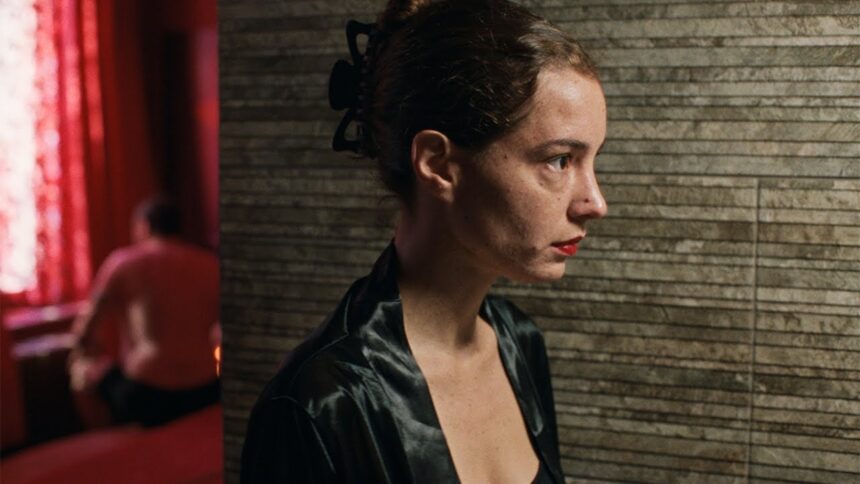Core Summary — Silent Strength: A Young Woman’s Fight for Hope
Kika is a powerful indie drama that traces the emotional and physical journey of a young woman confronting sudden loss, an unplanned pregnancy, and the challenges of survival. Set against a stark, unforgiving backdrop, the film reveals the strength found in vulnerability and the human connections that emerge in the darkest times.
Short Summary
Kika follows a young woman navigating the devastating aftermath of her father’s death and an unexpected pregnancy. Isolated and vulnerable, she faces societal judgment and personal fears while discovering unexpected friendships and inner strength. The film offers a raw, intimate portrayal of grief, resilience, and fragile hope that emerges from despair.
Detailed Summary
-
Protagonist and Initial Crisis: The film introduces Kika (Manon Clavel), who is already a mother to a young daughter. Her life is abruptly upended by the sudden death of her partner, David. Compounding her grief, she discovers she is pregnant with their second child.
-
Economic Desperation: Heartbroken and facing severe financial hardship, Kika finds herself in a precarious position. As a social worker herself, she experiences firsthand the indifference and inadequacy of the social support system in her own crisis.
-
Unconventional Solution: In a desperate bid for survival and to secure her future and that of her children, Kika makes a radical choice: she turns to sex work, specifically BDSM. This is presented not as a “descent” but as a pragmatic, deliberate, and unexpected path to agency and financial stability.
-
Exploration of BDSM: The film portrays BDSM in a non-sensationalized, realistic manner, focusing on it as a form of labor and a space where Kika paradoxically finds a sense of control, clarity, and even dignity. It delves into the complex dynamics of desire, vulnerability, and negotiation within these sessions.
-
Themes of Grief and Motherhood: Kika’s journey is deeply rooted in her unprocessed grief and her ambivalence and immense struggle around motherhood, highlighting the crushing demands placed on single mothers in difficult circumstances. The film explores the desire to be a mother despite overwhelming obstacles.
-
Social Realism and Agency: Alexe Poukine, drawing on her documentary background, grounds the narrative in social realism, avoiding clichés and judgmental portrayals. The film focuses on Kika’s resilience and agency, emphasizing her active choice to survive rather than waiting to be saved.
-
Male Vulnerability: Reviews suggest the film also grants rare narrative space to the vulnerability of the male clients, portraying them as complex figures seeking connection, containment, or confession.
-
Debut and Co-Production: This is Alexe Poukine’s first narrative feature film after a successful career in documentaries. It is a Belgian-French co-production.
Plot summary
-
The Shock of Loss: Kika, a social worker and mother of one, is devastated by the sudden death of her partner, David. In the immediate aftermath of this tragedy, she discovers she is pregnant again.
-
Financial Ruin and Systemic Failure: Faced with mounting debts and the loss of her partner’s income, Kika quickly realizes she is broke. Despite her own profession, she finds the social system offers little immediate help or understanding for her personal crisis, leaving her with dwindling conventional options.
-
An Unconventional Path: Driven by the urgent need to provide for her existing daughter and the unborn child, Kika makes the difficult and surprising decision to enter sex work, specifically the world of BDSM. This choice is depicted as a pragmatic solution born of necessity rather than a moral failing.
-
The World of BDSM as Labor: The film follows Kika as she navigates this new profession. Her encounters with clients are portrayed with a focus on negotiation, boundaries, and the unexpected dynamics of power and vulnerability within BDSM sessions. These “velvet rooms” become spaces of labor, where Kika surprisingly finds a sense of control and self-possession.
-
Internal Struggle and Resilience: While Kika gains financial footing, she continues to grapple with her profound grief, the demands of motherhood, and the judgment she might face. The narrative explores her internal struggle, her strength, and her fierce determination to survive and protect her children.
-
Redefining Dignity: Through her experiences, Kika redefines what dignity means to her, finding agency and empowerment in a space traditionally viewed as disempowering.
-
A Complex Portrait: The film builds towards a nuanced conclusion that doesn’t offer easy answers or imposed catharsis, instead allowing Kika to remain a complex, unfinished, yet powerfully present human being.
Director’s Vision
-
Authenticity and Non-Sensationalism: Drawing heavily on her documentary background, Alexe Poukine’s central vision is to portray the realities of sex work, particularly BDSM, with unflinching social realism, devoid of sensationalism or moral judgment.
-
Empowerment through Agency: She aims to tell a story of female empowerment that isn’t about domination, but rather about the “power of gentleness and vulnerability,” as Kika actively takes control of her situation rather than waiting to be saved.
-
Challenging Societal Injunctions: Poukine intends to explore the “female body as a site of social injunctions, but also of liberation,” unpacking the immense societal pressure on women to mother selflessly while exposing the punitive structures that make independent motherhood so challenging.
-
Humanizing the Unseen: Her vision includes dignifying spaces and lives that cinema often treats with scorn, presenting sex work and BDSM relationships as windows into complex human fragility and negotiation.
-
Emotional Nuance: Poukine seeks to capture the intricate emotional landscape of grief, economic hardship, and unexpected resilience, ensuring that Kika remains a multi-faceted character.
Themes
-
Grief and Loss: The profound emotional impact of sudden bereavement and the process of navigating unimaginable sorrow.
-
Female Agency and Empowerment: A woman’s fierce determination to survive and thrive on her own terms, even when choices are limited and unconventional.
-
Economic Necessity vs. Morality: The ethical dilemmas and personal compromises forced upon individuals in dire financial straits.
-
Motherhood in Crisis: The immense demands and societal pressures on single mothers, especially when faced with extreme hardship.
-
Perception vs. Reality of Sex Work: Challenging societal stigmas and portraying sex work, particularly BDSM, as a form of labor and a space for complex human interaction, control, and vulnerability.
-
Social System’s Indifference: A subtle critique of the inadequacy of social safety nets for individuals facing personal tragedy and economic collapse.
Key success factors
-
Bold and Relevant Premise: The film tackles highly sensitive and contemporary themes (grief, sex work, female agency, economic hardship) with courage and a non-judgmental approach.
-
Alexe Poukine’s Documentary Roots: Her background brings a raw authenticity and realism to the narrative, avoiding sensationalism and grounding the story in credible human experience.
-
Strong Lead Performance: Manon Clavel’s portrayal of Kika is highlighted by critics as “aching vulnerability” and “complex,” suggesting a powerful central performance that carries the film.
-
Festival Acclaim: Its premiere in Cannes Critics’ Week 2025 and nomination for the Caméra d’Or immediately provide significant prestige and critical attention.
-
Thought-Provoking Discourse: The film is designed to spark conversations about care, grief, financial independence, and the complexities of human desire and dignity in unconventional spaces.
Awards and Nominations
As of June 2025, “Kika (2025)” has received the following notable recognition:
Critics Reception
As of June 2025, following its World Premiere at Cannes Critics’ Week, “Kika (2025)” has garnered strong and overwhelmingly positive critical reception. Reviewers consistently praise Alexe Poukine’s brave and sensitive approach to a challenging subject matter, highlighting her ability to craft a deeply humane and non-judgmental portrait of a woman’s journey through grief and economic desperation. The film is lauded for its social realism, emotional authenticity, and its nuanced portrayal of sex work, particularly BDSM, as a space of unexpected agency and control. Manon Clavel’s lead performance is singled out for its vulnerability and complexity, firmly anchoring the film’s powerful narrative. Critics are noting its contribution to contemporary cinema by dignifying often-stigmatized experiences and sparking important conversations about female independence, care, and economic realities.
Reviews
Reviews for “Kika (2025)” consistently praise the film for its unique blend of social realism, emotional depth, and challenging themes:
-
UniversalCinema Mag calls “Kika” a film that “unfolds like a gentle romantic prelude” before becoming a “portrait of solitary endurance.” It emphasizes that Kika turns to BDSM “not as a descent, but as a deliberate choice in a world of dwindling options,” and that it is “not just economic—it is also, in its own understated way, a transformative practice of self-making.” The review highlights Poukine’s documentary roots in avoiding cliché and sensationalism, treating sex work “not as spectacle but as survival,” and presenting BDSM as “a sophisticated choreography of desire, vulnerability, and negotiation.” It also notes the film’s “poignant tensions” around motherhood and its “rare narrative space to male vulnerability.”
-
ScreenDaily describes “Kika” as a film where “Necessity is the mother of reinvention,” following a social worker who “takes desperate measures to remain solvent after her life is upended by tragedy.” It points to Manon Clavel’s performance as delivering “aching vulnerability.”
-
Cineuropa (in an early article about filming) noted that Poukine’s previous work “turned heads” and that “Kika paints the portrait of a young woman whose partner has just died and who is stupefied to realise she’s pregnant. Not only is her heart in pieces, she’s also totally broke, so she’s forced to sort out her priorities: first of all, dig herself out of this hole, and secondly, think about whether or not to keep the child.” They highlight the casting of Manon Clavel and Makita Samba, and Thomas Coumans.
-
Sortiraparis.com emphasizes the film’s selection for Cannes Critics’ Week and its contention for the Caméra d’Or, reflecting its recognition as a significant debut from a “new voice of world cinema.”
-
Alexe Poukine’s own statement, quoted by ScreenDaily, underscores her vision: “‘Kika’ is a continuation of my reflections on the female body as a site of social injunctions, but also of liberation. Faced with the obstacles she encounters, Kika doesn’t wait to be saved. For me, it’s a tale of empowerment that doesn’t promote domination but the power of gentleness and vulnerability.”
In summary, reviews uniformly laud “Kika” for its brave, nuanced, and empathetic portrayal of a woman making radical choices to survive, driven by grief and necessity, ultimately finding a unique form of agency and dignity.
Production Summary
“Kika (2025)” is a Belgian-French co-production, marking the narrative feature directorial debut of Alexe Poukine. It is an independent film focused on a character-driven, social realism narrative. Filming took place in the Brussels region.
Production companies
-
Wrong Men (Belgium)
-
Kidam (France)
Sales companies
Distribution companies
Release date on streaming
Specific streaming release dates for “Kika (2025)” are not yet announced. Its availability will depend on subsequent distribution deals after its initial theatrical and festival runs.
Theatrical Release
“Kika (2025)” had its World Premiere at the Cannes Film Festival 2025 (Critics’ Week selection) on May 16, 2025. Its theatrical release in Belgium is scheduled for June 25, 2025. A French release date is not yet known.
Why to recommend this movie
-
Bold and Empathetic Storytelling: It tackles a sensitive and often stigmatized subject (sex work) with profound empathy, realism, and a non-judgmental lens.
-
Powerful Female Protagonist: Kika’s journey of resilience and unconventional agency in the face of immense tragedy is incredibly compelling and empowering.
-
Exceptional Debut: Alexe Poukine’s transition from documentary to narrative feature is highly praised, showcasing a distinctive and important new voice in cinema.
-
Socially Relevant: The film engages with crucial contemporary themes of grief, economic hardship, and female independence, prompting important conversations.
-
Art-house Quality with Gritty Realism: It combines the contemplative depth of arthouse cinema with the raw honesty of social realism.
Why to Watch Movie
-
For a Raw and Realistic Drama: If you are drawn to films that don’t shy away from depicting the harsh realities of life but do so with dignity and nuance.
-
Experience a Unique Perspective: See a story that challenges conventional views on motherhood, survival, and empowerment through unconventional means.
-
Appreciate Strong Performances: Manon Clavel’s central performance is highlighted as a major strength, promising an emotionally resonant portrayal.
-
Support Independent, Thought-Provoking Cinema: Experience a film that pushes boundaries and explores complex human experiences with depth and authenticity.
-
Engage with Contemporary Social Issues: The film offers a powerful lens through which to consider economic precarity, the limitations of social systems, and female agency.
Movie Trend
Kika (2025) aligns strongly with the trend of “Social Realism Dramas” that confront difficult contemporary issues (e.g., economic hardship, sex work) with an unvarnished, empathetic lens. It also fits into the broader category of “Female-Centric Narratives” focusing on women’s resilience and agency, often in challenging circumstances. The director’s documentary background places it within the growing trend of “Documentary-Influenced Fiction,” where the authenticity and observational style of documentaries inform narrative filmmaking. Its selection at Cannes Critics’ Week further cements its place in “Festival-Circuit Arthouse Cinema.”
Social Trend
The film directly addresses the social trend of Economic Precarity and the Erosion of Social Safety Nets, particularly highlighting the vulnerability of single parents. It also contributes to the ongoing conversation around Sex Work and Decriminalization/Destigmatization, by presenting it as a form of labor rather than a moral failing. Furthermore, it touches upon the Challenges of Modern Motherhood and the societal pressures on women, along with themes of Grief and Mental Health in the face of sudden, traumatic loss.
Final Conclusions
Kika (2025) by Alexe Poukine stands as an exceptionally strong and vital narrative feature debut, distinguishing itself as a raw and deeply empathetic drama. The film bravely chronicles Kika’s harrowing journey from devastating grief and financial destitution following her partner’s sudden death, to her surprising and unconventional turn to BDSM as a means of survival and profound self-reclamation. Poukine’s seasoned documentary background infuses the narrative with an unflinching social realism, ensuring a non-sensationalized portrayal that challenges societal stigmas around sex work and female agency. With Manon Clavel delivering a universally praised performance, and having garnered significant recognition at Cannes Critics’ Week, “Kika” emerges as a powerful and thought-provoking contribution to contemporary cinema, illuminating the fierce resilience of the human spirit in the face of overwhelming adversity and prompting crucial conversations about care, economic independence, and the dignity found in unconventional choices.







